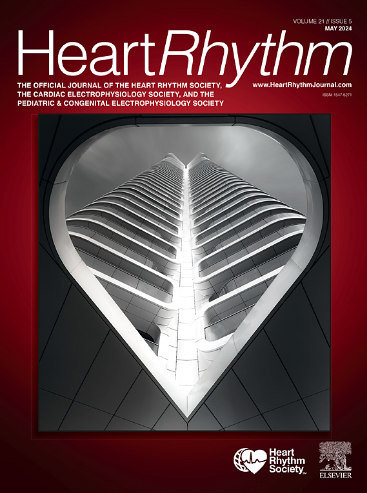Artificial intelligence age prediction using electrocardiogram data: Exploring biological age differences
IF 5.6
2区 医学
Q1 CARDIAC & CARDIOVASCULAR SYSTEMS
引用次数: 0
Abstract
Background
Biological age can be predicted using artificial intelligence (AI) trained on electrocardiograms (ECGs), which is prognostic for mortality and cardiovascular events.
Objective
We developed an AI model to predict age from an ECG and compared baseline characteristics to identify determinants of advanced biological age.
Methods
An AI model was trained on ECGs from cardiology inpatients aged 20–90 years. AI analysis used a convolutional neural network with data divided in an 80:20 ratio (development/internal validation), with external validation undertaken using data from the UK Biobank. Performance and subgroup comparison measures included correlation, difference, and mean absolute difference.
Results
A total of 63,246 patients with 353,704 total ECGs were included. In internal validation, the correlation coefficient was 0.72, with a mean absolute difference between chronological age and AI-predicted age of 9.1 years. The same model performed similarly in external validation. In patients aged 20–29 years, AI-ECG–predicted biological age was greater than chronological age by a mean of 14.3 ± 0.2 years. In patients aged 80–89 years, biological age was lower by a mean of 10.5 ± 0.1 years. Women were biologically younger than men by a mean of 10.7 months (P = .023), and patients with a single ECG were biologically 1.0 years younger than those with multiple ECGs (P < .0001).
Conclusion
There are significant between-group differences in AI-ECG–predicted biological age for patient subgroups. Biological age was greater than chronological age in young hospitalized patients and lower than chronological age in older hospitalized patients. Women and patients with a single ECG recorded were biologically younger than men and patients with multiple recorded ECGs.
利用心电图数据进行人工智能年龄预测:探索生物年龄差异。
背景:通过心电图训练的人工智能(AI)可以预测生物年龄:人工智能(AI)可以通过心电图(ECG)预测生物年龄,而心电图是死亡率和心血管事件的预后指标:我们开发了一个人工智能模型,通过心电图预测年龄,并比较了基线特征,以确定高生理年龄的决定因素:方法:我们在 20-90 岁心脏病住院患者的心电图上训练了一个人工智能模型。人工智能分析使用卷积神经网络,数据按 80:20 的比例分配(开发:内部验证),外部验证使用英国生物库的数据。性能和亚组比较指标包括相关性、差异和平均绝对差异:共纳入 63,246 名患者和 353,704 张心电图。在内部验证中,相关系数为 0.72,计时年龄与人工智能预测年龄之间的平均绝对差值为 9.1 岁。同一模型在外部验证中的表现类似。在 20-29 岁的患者中,AI-ECG 预测的生理年龄平均比实际年龄大(14.3±0.2)岁;在 80-89 岁的患者中,生理年龄平均比实际年龄小(10.5±0.1)岁。女性的生理年龄平均比男性小 10.7 个月(P=0.023),仅有一张心电图的患者的生理年龄比有多张心电图的患者小 1.0 岁(PC结论:患者亚组的 AI-ECG 生物年龄存在明显的组间差异。年轻住院患者的生理年龄大于实际年龄,而年长住院患者的生理年龄小于实际年龄。女性和仅有一次心电图记录的患者的生理年龄小于男性和有多次心电图记录的患者。
本文章由计算机程序翻译,如有差异,请以英文原文为准。
求助全文
约1分钟内获得全文
求助全文
来源期刊

Heart rhythm
医学-心血管系统
CiteScore
10.50
自引率
5.50%
发文量
1465
审稿时长
24 days
期刊介绍:
HeartRhythm, the official Journal of the Heart Rhythm Society and the Cardiac Electrophysiology Society, is a unique journal for fundamental discovery and clinical applicability.
HeartRhythm integrates the entire cardiac electrophysiology (EP) community from basic and clinical academic researchers, private practitioners, engineers, allied professionals, industry, and trainees, all of whom are vital and interdependent members of our EP community.
The Heart Rhythm Society is the international leader in science, education, and advocacy for cardiac arrhythmia professionals and patients, and the primary information resource on heart rhythm disorders. Its mission is to improve the care of patients by promoting research, education, and optimal health care policies and standards.
 求助内容:
求助内容: 应助结果提醒方式:
应助结果提醒方式:


